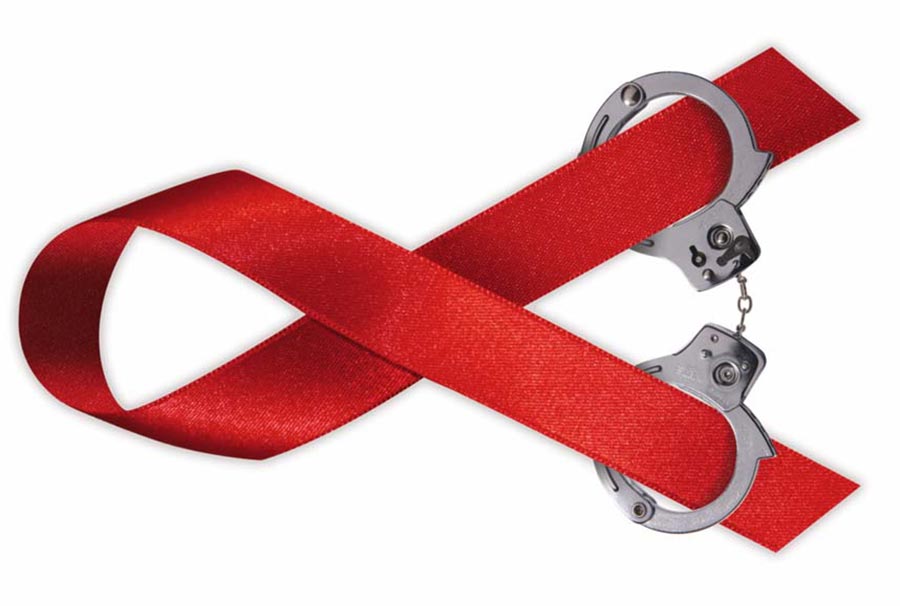Julie A. Graham, an HIV-positive Pennsylvania nurse, knows firsthand the devastating effects of HIV criminalization. In 2014, Graham was charged with two felonies and two misdemeanors for allegedly having sex with her boyfriend without disclosing her serostatus.
Graham recently completed a diversionary program and seeks to have her criminal record expunged. But the ordeal has taken its toll.
“The harassment I endured was extremely traumatizing,” Graham told PGN. “The charges also jeopardized my career. I had to pay $25,000 in fees to attorneys and Lebanon County. I also lost about $50,000 in wages and benefits. So obviously I’m a big supporter of HIV decriminalization.”
The AIDS Law Project of Pennsylvania, which provided assistance to Graham, recently issued a position paper calling for HIV decriminalization.
To law-project staffers, clients and supporters, criminalizing people with HIV is the embodiment of HIV discrimination.
“HIV criminalization is a bad idea everywhere,” said Ronda B. Goldfein, the law project’s executive director. “A person’s virus should not be an element of the criminal-justice process.”
Adrian M. Lowe, a staff attorney at the law project, echoed Goldfein’s sentiments.
“HIV criminalization is one of the many manifestations of HIV discrimination,” Lowe said. “Treating someone differently because of their HIV status is the very definition of HIV discrimination.”
Many states have laws specifically targeting HIV-positive people who engage in sex without disclosing their serostatus. Some states prosecute HIV-positive people for other reasons, including biting or spitting on someone.
Pennsylvania doesn’t have a criminal statute that specifically criminalizes HIV-positive people who engage in sex without disclosing their serostatus. But prosecutors throughout the state have charged HIV-positive people under other criminal statutes, such as sexual assault, simple assault, aggravated assault or reckless endangerment.
Goldfein would like to see that practice end.
“We’ve assisted approximately 12 people in the past two years who were facing criminal charges related to their HIV status,” Goldfein said. “Our goal in all of these cases is to take HIV out of the equation.”
She questioned why HIV-disclosure issues should be the concern of law-enforcement authorities.
“Why does it have to be the role of law enforcement to monitor the conversations between sex partners?” Goldfein posed.
She said HIV shouldn’t be a factor when decisions are made about charging a person with a crime, nor the length of a prison sentence if an HIV-positive person is convicted.
The law project’s 13-page report, entitled “All Pain, No Gain,” was partially funded by a $10,000 grant by private donors. The report notes that HIV criminalization may actually worsen the health crisis.
“Criminalization may exacerbate instead of reducing HIV transmission because it places the entire burden on the person living with HIV to disclose their status and adjust their sexual activity accordingly,” the report states.
HIV criminalization also provides a disincentive for people to learn their HIV status, for fear of “the potential criminal liability that accompanies awareness of one’s HIV status,” according to the report.
Goldfein hopes law-enforcement officials will consider the report’s findings with an open mind.
“Our goal is to talk to police and prosecutors and discuss that HIV should never be a factor in charging,” said Goldfein. “We want to have a real conversation about risk and transmission and that penalties should be related to the real risk and real harm. Decisions should be made on the basis of real science, not knee-jerk fear and stigma.”
She said Pennsylvanians could be designated as sex offenders simply because they had sex while HIV-positive, and be required to report their address to state police every year.
“AIDS discrimination and stigma is alive and well in Pennsylvania,” she noted.
Still, Goldfein expressed optimism that “All Pain, No Gain” will find a receptive audience throughout the state.
“I think it’s an uphill battle to decriminalize HIV,” Goldfein continued. “But every medical development that shrinks the risk of transmission supports the reform of HIV criminalization.”
She also pointed to recent medications that help HIV-people maintain undetectable viral loads. “The research that we’ve cited in the report has not found a case of transmission from the person who’s undetectable. Reform seems even that much more crucial considering the unlikelihood of transmission.”
Goldfein, Lowe and Graham plan to attend a national conference next month in Alabama, focusing on the subject of HIV decriminalization.
“We’ve seen a negative approach to people with HIV,” Goldfein continued. “In response, there’s been a huge call for reform.”
Lowe said the law project serves as a resource for law-enforcement authorities who wish to learn more about the subject.
“We’re hoping the report will be read by district attorneys, police chiefs and judges across the state,” Lowe concluded. “And we want to make ourselves a resource to discuss this subject further.”

